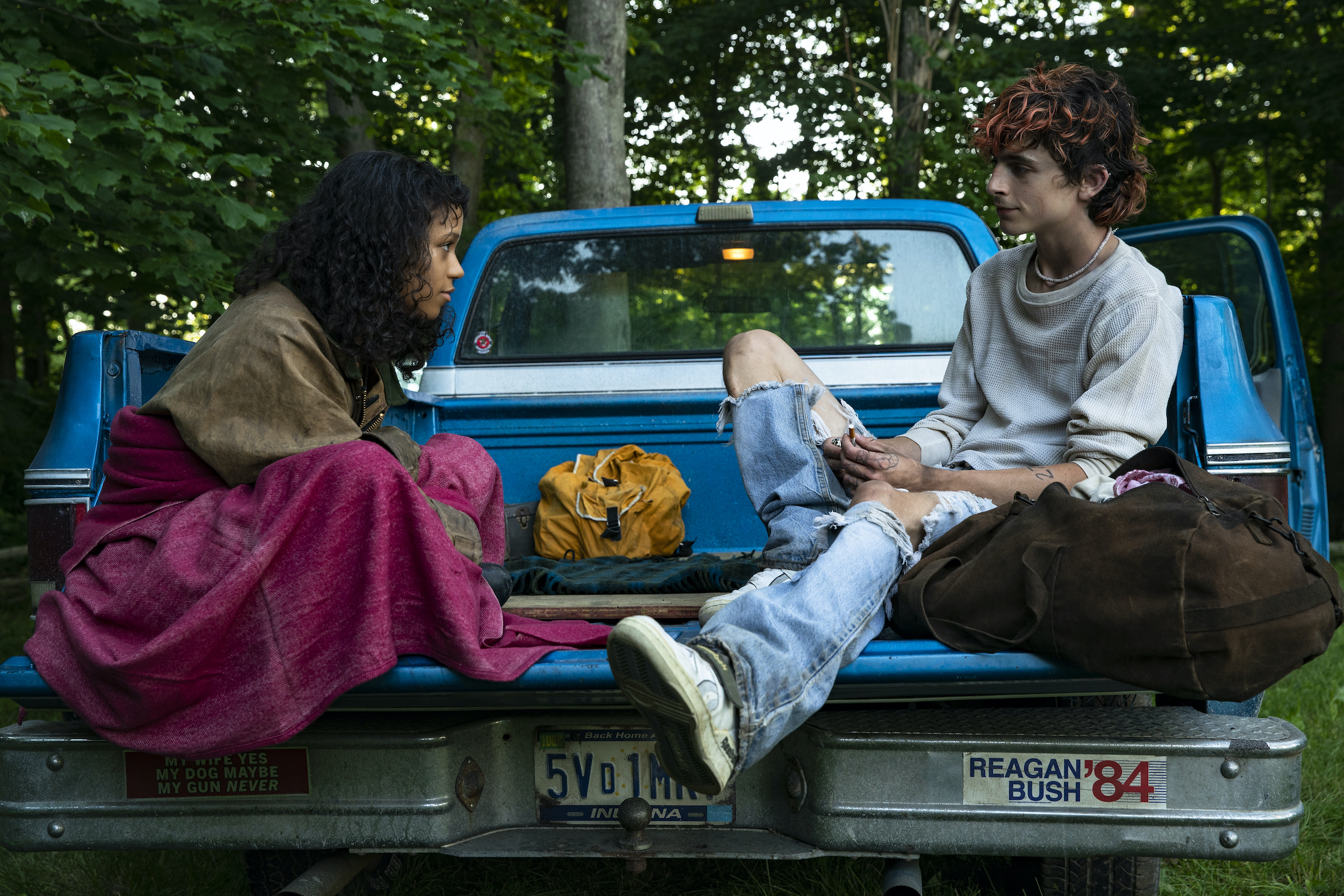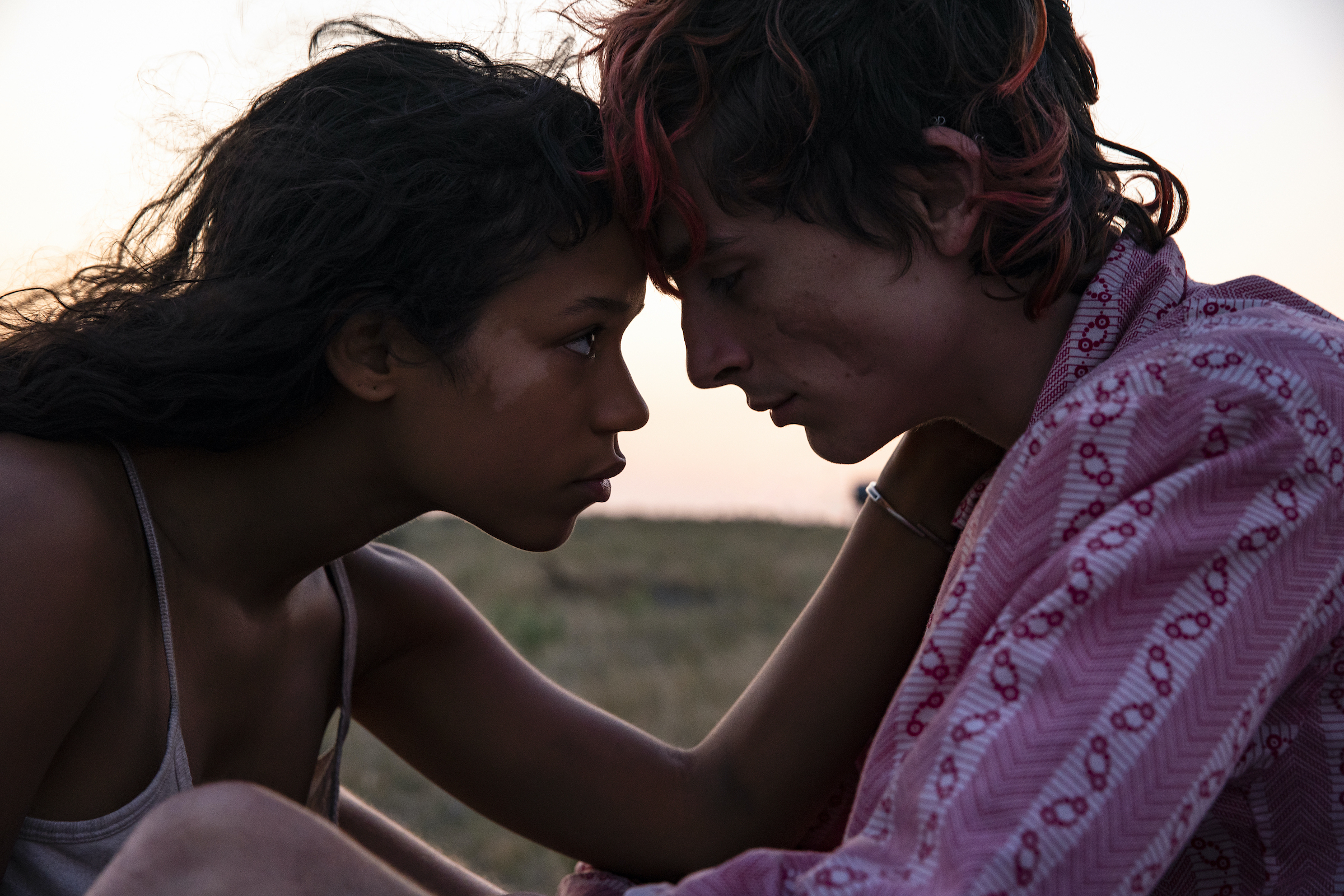
Cannibals are the ultimate drama queens. Forget vegans, the lactose intolerant, those who remain vigilant against gluten: No one has to worry more than a cannibal about where the next meal is coming from. Beyond that, cannibal love poses additional problems. How to broach the subject of this dietary proclivity with someone you’re attracted to? Or is it better to associate only with your kind, to break bread—or whatever—only with those wholly in tune with your needs and impulses?
Luca Guadagnino’s Bones and All, playing at the 79th Venice Film Festival, pleads sympathy for those who crave human flesh: in the movie’s universe, they’re tragic figures, a little like vampires but not nearly as sexy, people who didn’t ask to be born with such unholy cravings but who must learn to live with them nonetheless. (The movie was adapted from Camille DeAngelis’ 2016 novel of the same name.) Guadagnino’s film is artful and tender, if occasionally almost too tense and brutal to bear. Watching it—waiting to see where it was going to end up, and finding myself in thrall to one performance in particular—I wondered if this film might haunt me forever. But after it was over, I found I could shake its spell easily. Bones and All is fastidiously romantic. It’s so carefully made, and so lovely to look at, even at its grisliest, that it ends up seeming a little remote, rather than a movie that draws you close. Still, its actors give you something to watch every minute. And Guadagnino—whose last movie was the drab 2018 Suspiria remake—at least keeps this extended metaphor for loneliness and alienation whirring. Whatever else you might say about it, Bones and All is never boring.
And the movie’s first third or so is truly haunting: we meet lonely teenager Maren Yearly (Taylor Russell, the sensational young actor who anchored Trey Edward Shults’ underappreciated 2019 family drama Waves), who’s living somewhere in 1980s Virginia with her father (played, with marrow-deep mournfulness, by André Holland). She’s a loner, but not by choice. A friendly classmate invites her to a sleepover, and though her father, for reasons that later become clear, locks her in her room at night, she sneaks out and makes her way to the girl’s house. As she and her new friend lie huddled side-by-side on the floor, Maren takes the girl’s finger into her mouth down to the knuckle, in a moment that at first looks like tentative sexual exploration. Then she bites down, hard, devouring it almost before she realizes what she’s done.
Read more: The 52 Most Anticipated Movies of Fall 2022

It’s a horrifying moment, and it sets the movie buzzing like a restless insect. When Maren’s father finds out what’s happened, he hustles his daughter into the family car, hightailing it to another state. This is the rhythm they’ve settled into over the years, anytime Maren’s uncontrollable urges get the better of her. But one day, Maren wakes up to find her father gone. He has left her a tape, outlining significant events in her life—describing those moments in which he was forced to reckon with her true nature—and explaining that he can’t protect her anymore, that she’ll have to find her own way. To hear Holland’s voice on this tape, resigned to abandon the person he loves more than anyone, is to step squarely into the melancholy heart of this portion of the movie.
Maren’s father has also left behind a wad of cash and her birth certificate, the latter of which gives her clues to the whereabouts of the mother she’s never known. Was her mother like her? She needs to know. And so she strikes out on a middle-American odyssey, during which she learns that there are others like her. The first fellow traveler she meets is Sully, played by an almost too-creepy Mark Rylance, a rickety gent who refers to himself in the third person and speaks in a sinister-soothing Jimmy Stewart drawl. Sully teaches Maren a thing or two, like how to find meals without actually killing people—or at least not directly. The two share a lip-smacking, bloody raw dinner—for easier cleanup, Sully has stripped down to his skivvies. (Bones and All is an almost 100 percent humorless movie, and I believe I was the only person who laughed when Sully wiped his bloody hands, old-man-style, on his saggy white underpants.) But most important, Sully teaches Maren how to recognize others like them. And that’s how she meets the lanky loner who will become her spiritual twin, the reckless, dreamy-eyed Lee (Timothée Chalamet), another lone wolf cannibal who’s been torn away from his family and who makes his way in the world as best he can, feeding on the worst people he can find as a way of assuaging his own guilt and self-loathing.
Read more: Timothée Chalamet Wants You to Wear Your Heart on Your Sleeve
Chalamet is just about everybody’s darling these days, and in Bones and All, he doesn’t disappoint. His scruffiness is the elfin kind, and he surveys the world from heavy-lidded, appraising eyes. His clothing, often stolen from his victims, includes droopy-cool PJ shirts and jeans torn practically from thigh to ankle—they’re almost like invisible pants, revealing his underfed bones beneath.
Lee and Maren are a perfect match. They learn from each other, and they share their bloody secrets with one another, often accompanied by austere, meticulously plucked guitar notes that dot the movie’s aural landscape like invisible dandelion seed. (The music, tasteful to a fault, is by Trent Reznor and Atticus Ross.) But even though this romance is supposed to be the movie’s heartbeat, something goes out of the picture when Chalamet shows up, as languidly charming as he is. Because even though he’s the bigger star, it’s Russell who owns the movie. Maren wears her hair in baby bangs that hark back to a childhood innocence she never had the luxury of enjoying. Her face is wholly open to a world that wants nothing to do with her. When I said I found Bones and All surprisingly easy to shake off, I wasn’t being wholly honest with myself: the desolation of Maren’s face in the movie’s early scenes—an expression of loneliness and self-revulsion, overshadowed by an even stronger will to live—is what I’ll remember when I look back on Bones and All. A doomed romance is one thing—we see those all the time. But a doomed love of self is the bigger tragedy, and in this movie, that’s the music and language of Russell’s face.
More Must-Reads from TIME
- Cybersecurity Experts Are Sounding the Alarm on DOGE
- Meet the 2025 Women of the Year
- The Harsh Truth About Disability Inclusion
- Why Do More Young Adults Have Cancer?
- Colman Domingo Leads With Radical Love
- How to Get Better at Doing Things Alone
- Michelle Zauner Stares Down the Darkness
Contact us at letters@time.com